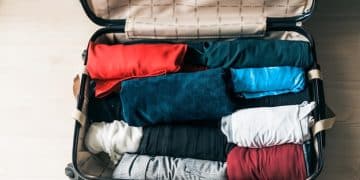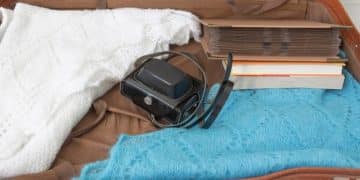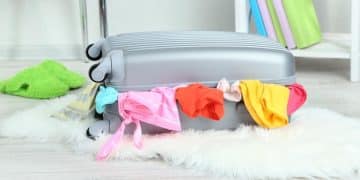Pack Like a Pro: Maximize Space by Rolling Your Clothes
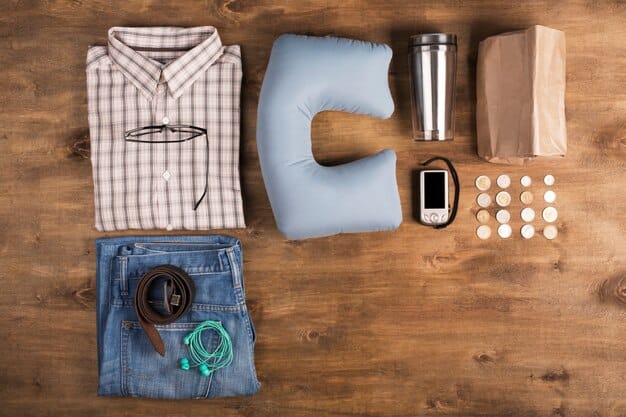
Rolling your clothes is a highly effective method for saving space in your luggage, minimizing wrinkles, and keeping your belongings organized while traveling, ensuring you pack like a pro and maximize space.
Are you tired of struggling to fit everything into your suitcase? One of the best travel hacks to maximize space is to **pack like a pro: a step-by-step guide to rolling your clothes for maximum space**. This simple technique can revolutionize the way you pack, allowing you to bring more items while keeping your luggage organized and wrinkle-free.
Why Rolling Clothes Saves Space
Rolling your clothes might seem like a minor adjustment, but it can make a significant difference in how much you can fit in your suitcase. Understanding the science behind why this method works can help you appreciate its benefits.
Maximizing Surface Area
When you fold clothes, you create hard creases and bulky layers that take up more space. Rolling, on the other hand, compresses the fabric into a tighter, more cylindrical shape, effectively maximizing surface area and fitting into smaller gaps.
Compression Techniques
Rolling clothes allows for better compression compared to folding. The tight cylindrical shape reduces air pockets, making your clothes more compact and dense. This is especially useful for thicker items like sweaters and jeans.
- Increased space: Rolling saves more space than folding.
- Wrinkle reduction: Rolling minimizes creases and wrinkles.
- Better organization: Rolled clothes are easier to see and access.
Rolling your clothes isn’t just about saving space; it’s also about optimizing your packing strategy to ensure everything fits comfortably and stays in good condition.
Step-by-Step Guide to Rolling Clothes
Now that you understand the benefits, here’s a detailed guide on how to roll your clothes effectively, helping you to pack like a pro.
Step 1: Preparing Your Clothes
Start by laying your garment flat on a clean surface. For shirts, button them up to maintain their shape. For pants, smooth out any wrinkles. Proper preparation ensures a tighter and more uniform roll.
Step 2: Folding and Smoothing
Fold the item vertically, such as folding a T-shirt by bringing one side halfway across the back. Smooth out any wrinkles or bunching to create a flat surface for rolling. This step is crucial for minimizing creases.
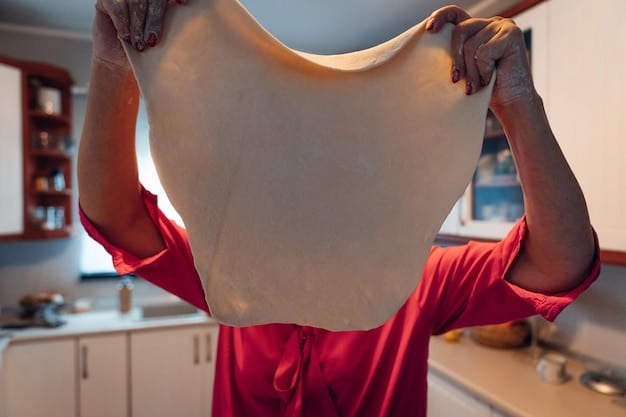
Step 3: Rolling Tightly
Begin rolling tightly from the top (collar) down to the bottom edge. The tighter the roll, the more space you’ll save. Ensure the roll is uniform to prevent any awkward bulges.
- Shirts: Fold in the sleeves, then roll from the collar.
- Pants: Fold in half lengthwise, then roll from the waist.
- Socks: Place socks on top of each other and roll together.
Rolling your clothes correctly involves a combination of preparation, folding, and tight rolling to maximize space and minimize wrinkles. Following these steps will help you pack efficiently and stay organized.
Different Rolling Techniques for Various Garments
Not all clothes are created equal, and some require specific rolling techniques to achieve the best results. Here’s how to handle different types of garments.
The Ranger Roll
The ranger roll is perfect for small items like socks, underwear, and t-shirts. It involves creating a small pocket to secure the roll, making it extra compact and preventing unraveling.
The Military Roll
Similar to the ranger roll, the military roll is used for durable, wrinkle-resistant clothing. This method involves tightly rolling the garment and securing it with its own fabric to prevent it from coming undone.
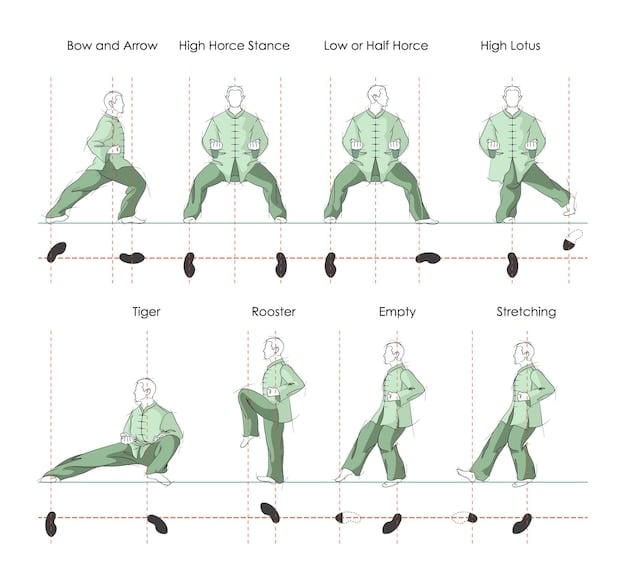
The Hybrid Roll
The hybrid roll combines elements of both folding and rolling. This technique is ideal for delicate items that need some structure. Begin by folding the item in half, then roll it tightly to minimize wrinkles and save space.
- Ranger Roll: Ideal for small, casual items.
- Military Roll: Best for durable, wrinkle-resistant clothes.
- Hybrid Roll: Suitable for delicate or structured garments.
By mastering different rolling techniques, you can customize your packing approach to suit various types of clothing. This ensures everything stays neat, compact, and wrinkle-free throughout your travels.
Benefits of Rolling Clothes for Travel
Beyond just saving space, rolling clothes offers a multitude of benefits that can significantly enhance your travel experience.
Reduced Wrinkles
Rolling clothes helps to minimize wrinkles by preventing sharp creases that occur with folding. When clothes are rolled, the fabric is stretched and compressed, which keeps them smoother.
Easy Access to Items
With rolled clothes, you can easily see and access each item without having to unpack your entire suitcase. This is particularly useful when you need something quickly while on the go.
Maximizing Luggage Space
The greatest advantage of rolling clothes is the amount of space it saves. By compressing your clothes into tight rolls, you can fit more items into your luggage. This is especially beneficial for carry-on luggage when you want to avoid checked baggage fees.
Rolling your clothes offers many advantages beyond just saving space. From reducing wrinkles to improving organization, this method can make your travel experience more convenient and enjoyable.
Tips for Optimizing Rolled Clothes in Your Luggage
To make the most of rolling clothes, it’s essential to optimize how you arrange them in your luggage. Here are some tips to help you pack like a pro.
Strategic Placement
Place heavier items like jeans and shoes at the bottom of your suitcase, close to the wheels, to maintain balance. Place rolled clothes on top of and around these items to fill in gaps.
Using Packing Cubes
Packing cubes are fabric containers that help compress and organize your clothes. Use them to keep your rolled items together and prevent them from shifting during travel. Packing cubes also make it easier to unpack and repack your luggage quickly.
Filling Empty Spaces
Utilize every nook and cranny in your suitcase. Roll smaller items like socks and underwear and tuck them into shoes or between larger items. This maximizes space and prevents clothes from shifting.
- Bottom placement: Heavier items at the bottom for balance.
- Packing cubes: Organize and compress items.
- Fill spaces: Use small items to fill gaps effectively.
Optimizing the placement of your rolled clothes in your luggage can make a significant difference in how much you can pack and how well your items stay organized.
Common Mistakes to Avoid When Rolling Clothes
While rolling clothes is a straightforward technique, there are common mistakes that can hinder its effectiveness. Here’s what to avoid when packing.
Rolling Too Loosely
Rolling clothes too loosely defeats the purpose of saving space. Ensure you’re rolling tightly to compress the fabric and reduce air pockets. A loose roll will take up more room and may unravel during travel.
Ignoring Wrinkle-Prone Fabrics
Some fabrics, like linen and silk, are more prone to wrinkling. For these items, consider using a hybrid roll or placing them inside a dry cleaning bag before rolling. This provides an extra layer of protection against creases.
Overpacking
Even with rolling techniques, overpacking can lead to a disorganized and heavy suitcase. Be mindful of what you truly need for your trip and avoid bringing unnecessary items. Plan your outfits and stick to a minimalist packing list.
Avoiding these common mistakes will help you maximize the benefits of rolling clothes, ensuring your luggage is well-organized and wrinkle-free throughout your travels.
| Key Point | Brief Description |
|---|---|
| ✈️ Space Saving | Rolling clothes compresses them, maximizing luggage space. |
| 🛡️ Wrinkle Reduction | Rolling minimizes creases, keeping clothes smoother. |
| 🧳 Organization | Rolled clothes are easier to see and access in your luggage. |
| 🧦 Different Techniques | Use Ranger, Military, or Hybrid rolls for best results. |
Frequently Asked Questions
▼
Yes, rolling clothes significantly saves more space compared to folding. The tight cylindrical shape compresses the fabric, reduces air pockets, and maximizes luggage capacity, making it a great hack.
▼
The ranger roll technique is ideal for small, casual items like socks, underwear, and T-shirts. It creates a compact and secure roll, preventing unraveling during travel and saving space.
▼
To minimize wrinkles, ensure you roll your clothes tightly and smoothly. For wrinkle-prone fabrics, use a hybrid roll or place the item inside a dry cleaning bag before rolling to reduce wrinkles.
▼
Packing cubes help compress and organize your rolled clothes, keeping them together and preventing shifting during travel. They also simplify unpacking and repacking, ensuring your luggage stays tidy.
▼
While rolling generally saves more space, the best method depends on the item. Rolling is excellent for casual and wrinkle-resistant clothes, while folding might be better for structured or delicate items to maintain their shape.
Conclusion
Mastering the art of rolling your clothes can transform your travel experience, allowing you to pack more efficiently and keep your belongings organized. By following this step-by-step guide and utilizing different rolling techniques, you’ll be well-equipped to make the most of your luggage space and travel like a pro.
